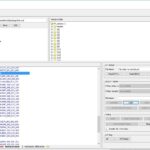Diving into the world of car tuning can be exciting, especially for models like the Ford Fiesta ST known for their sporty performance. Many enthusiasts turn to OBD2 devices for both diagnostics and performance enhancements. Among these, Diablosport tuners are a recognizable name. However, are they always the right choice? This article explores a user’s firsthand experience with a Diablosport Intune on a Fiesta ST, highlighting potential issues and raising questions about whether a dedicated tuner or a more general OBD2 scanner is the better tool for your car.
One Fiesta ST owner decided to try a Diablosport Intune tuner, hoping to easily upgrade their car’s performance with a 91 octane tune. Having a spare Ford license for the Intune, the user thought it would be a straightforward process. However, the experience quickly turned sour. After installing the tune on their low-mileage 2016 Fiesta ST, the engine immediately threw two perplexing error codes: PCM0C00 (Drive Motor A Current) and PCM3400 (Cylinder Deactivation Malfunction). These codes seemed completely unrelated to engine tuning, raising immediate red flags.
Worse than the confusing codes, the car entered limp mode, drastically reducing engine power and feeling like zero boost was available. The check engine light (CEL) and service soon light illuminated, compounding the problem. Cycling the engine on and off temporarily reset the limp mode, but the underlying issue remained. The user, experienced with tuning, logged the data and reverted the car back to the stock tune before contacting Diablosport for support.
To their credit, Diablosport attempted to resolve the issue. They provided a custom tune specifically tailored for the Fiesta ST. Unfortunately, this custom tune resulted in the exact same error codes and limp mode activation, triggered under Wide Open Throttle (WoT) or when exceeding 6000 RPM. Another data log was sent back to Diablosport, and the car was once again returned to its stock configuration. Instead of pursuing further custom tunes, Diablosport then suggested a unit update to fix the problem. Disappointingly, even after updating the Intune device, the limp mode persisted, now accompanied by a new error code: PCM:C0200 (ISO/SAE Reserved).
Frustrated and losing confidence in the Diablosport solution for their Fiesta ST, the owner decided to utilize the tuner solely for adjusting tire size settings to correct speedometer readings due to aftermarket 215/40/17 tires. While Diablosport offered to continue troubleshooting, the user’s primary goal was ease of use and avoiding headaches typically associated with canned tunes. Ultimately, the decision was made to request a refund and explore alternative tuning options, specifically mentioning Mountune and Cobb, which are more popular and reputable within the Fiesta ST community.
Diablosport was unable to pinpoint the exact cause of the problems but suggested it wasn’t a widespread issue across all Fiesta STs. However, given Diablosport’s relatively limited presence in the Fiesta ST tuning scene, the user couldn’t verify this claim. This experience serves as a cautionary tale for Fiesta ST owners considering Diablosport Intune for tuning. While OBD2 scanners and tuners like the Diablosport Intune can offer diagnostic capabilities and performance enhancements, compatibility and reliability can vary significantly between car models and tuning devices. For the Fiesta ST, it appears that other platforms might offer a more seamless and trouble-free tuning experience. When choosing between a Diablosport or a generic OBD2 scanner for your Fiesta ST, consider whether you need deep diagnostic capabilities or performance tuning, and research community feedback for device-specific compatibility and common issues.
